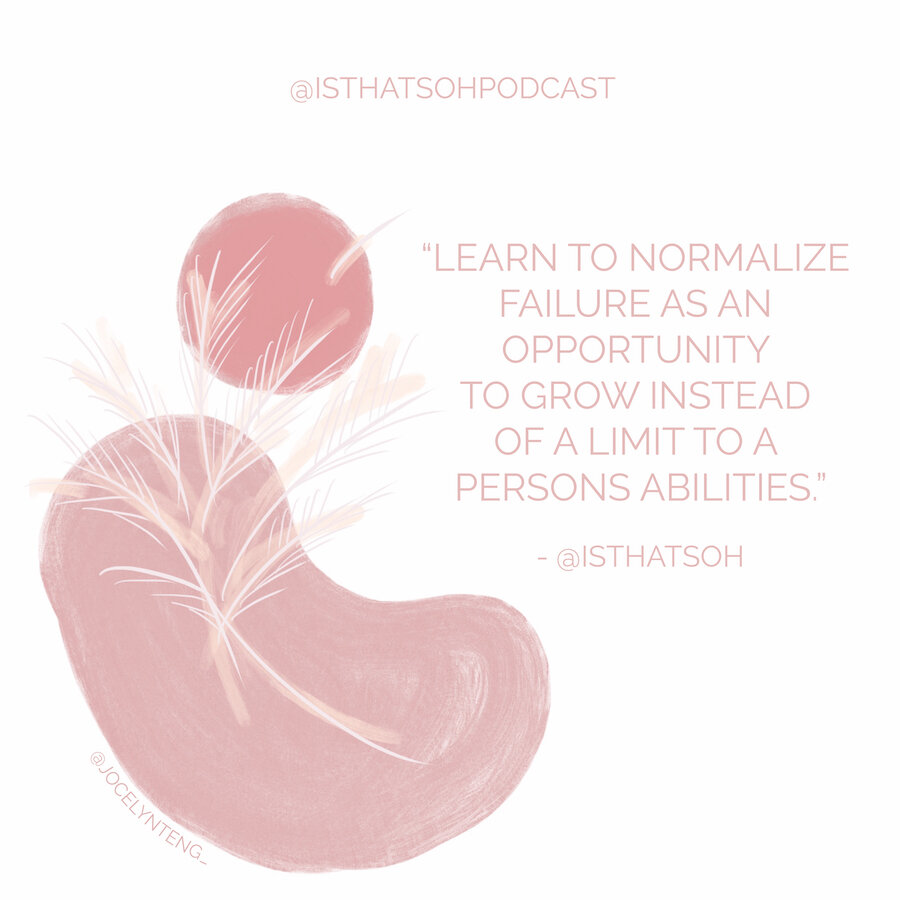EPISODE 9: BREAKING HABITS OF SELF SABOTAGE BY UNDERSTANDING SHAME
Hello and welcome back to the Is That Soh Podcast
Today on the podcast I wanted to talk to you about why we self-sabotage and how by understanding shame, we can break habits that hold us back from believing we are capable of achieving what we want.
The reason why I wanted to talk to you about these topics is because I personally haven’t really been feeling so great lately and it reminded me that a lot of people struggle with this exact thing. Since I was doing the research and going on my own little self-help binge anyways, I decided that it would be useful to also share the information I found with you too so you can better understand your own self-sabotage habits and do what you can to free yourself from what is inevitably holding you back.
“A secret only has power if you keep it a secret.”
Have you ever heard the expression ‘a secret only has power if you keep it a secret’? Well, that is how shame, fear, self-doubt, and regret thrive. They make you question yourself and eat away at your confidence until you begin to self-sabotage your progress until eventually you just give up
Why do people self-sabotage?
A low sense of self-worth - Ironically a lot of people feel they are undeserving of success and happiness and use work to make up for inadequacies they see in themselves. These people hate themselves so much that they overwork themselves until they have no one close around them or are burnt out because deep down they think they are unworthy of true happiness.
Control - Sometimes it feels better to have control over your own failure rather than face the possibility of it blindsiding you and taking you by surprise. Self-sabotage is never a fun thing to do, but it can feel better than spinning out of control for some people.
Imposter syndrome - feelings of inadequacy that persist despite evidence of past success or external proof of being competent. This can result in someone doing the bare minimum and putting the least amount of effort into something so they can act like it doesn’t mean that much to them or if a person is still finding your footing and feel unsure of your own capabilities, they question whether they are smart enough for the job and torture themselves with the possibility of being humiliated when it all becomes revealed to the world that they can’t cut it.
I think imposter syndrome is quite common in today’s society. We always want instant success, instant gratification, instant praise when really we need to give ourselves time to learn, adapt, and grow before we can really start to feel comfortable with our capabilities especially when starting a new role.
Photo By Samuel Elias Nadler
“I have not failed, I’ve just found 10,000 ways that won’t work.”
- Thomas Edison after inventing the lightbulb,
Instant success is as probable as winning the lottery and most people have to fail multiple times before they can find the right formula for success. Instead, learn to normalize failure as an opportunity to grow instead of a limit to a person’s abilities.
Needing a scapegoat - Its easier to pawn off your failure by saying, ‘well, I never paid attention in class’ instead of ‘I didn’t understand the material’ or ‘my boss plays favorites’ instead of ‘I failed to show I was more capable for the job’. Using scapegoats are an easy way for people to brush off their own failures or willingness to address and recorrect their own behaviors.
Lack of motivation - you have a list of stuff you need to do but instead, procrastinate until it becomes too late to get any of it done. A lack of motivation is also how we find excuses for focusing on other things besides the task at hand like needing to clean your apartment or folding laundry before you can actually sit down and get to work.
I know I’m often guilty of doing all the little, easy stuff on my ‘to-do list’ first instead of investing my time on bigger tasks that would actually move the needle forward because they seem so daunting. This often tends to lead to the feeling of being perpetually stuck in one place because I’m ‘faking productivity’. I’m not actually doing anything productive to achieving my goals, I’m only maintaining what I have done so far, which perpetuates this vicious cycle of lacking further motivation because I’m not seeing any progress.
Connection is why we are here. The ability to feel a connection is what drives us as a society. We have this innate desire to stay connected our biggest fear and where shame thrives, is the worry of becoming disconnected.
Here is the thing about shame though, it loses its power when you talk about whatever it is that is causing you to feel the shame in the first place because, at its core, shame requires you to believe you are alone in order for it to maintain its power.
Photo by Perry Grone
“Most people associate being vulnerable with weakness, uncertain risk, and exposure but in truth it’s about daring greatly.”
if we embrace the fact that no body is perfect, and begin to understand that being imperfect is not a curse but completely natural, then we can find the courage to share and see the beauty in rawness. There is courage in saying our truth and there is an opportunity for relief from internal struggle. If you can rewire out brains so that we can believe that what makes you vulnerable also makes you beautiful then it becomes a lot easier to accept parts of ourselves the once filled us with shame.
Sure it may not be comfortable to share but its also not suppose to be easy. That’s after all how shame keeps its power. It is banking on the fact that you will take the easier route. Talking about how you are felling, saying it aloud, sharing your fears not only makes it easier to expose what is really holding you back but also frees you from the power they had over you. Learning to embracing imperfection also believe it or not, makes you more relatable and beautiful because it gives you an opportunity to connect with others through a shared experience which can give you a sense of belonging.
Through empathy we can actually connect better with other. We can build connections, feel less alone, find acceptance for ourselves and more importantly move forward away from our deepest fears. We are able to turn to ourselves and finally say, ‘I am capable’, ‘I am deserving,’ and ‘I am enough’. Three statements shame tries to destroy in us if we let it.
“Shame needs three things to grow exponentially - secrecy, silence, and judgment. And when we numb vulnerability, we are also numbing joy, gratitude, happiness, purpose, creativity, a sense of belonging, love, and meaning.” - Brené Brown
if you can find the courage to embrace your vulnerability, to be imperfectly authentic, to talk about what you are scared of, you also open the door to beauty, growth, and healing and that is how you move forward when that little tiny voice in your head tells you, you can’t.
OTHER HELPFUL RESOURCES
PSYCHOLOGY TODAY - 5 Ways To Stop Self Sabotaging Yourself
ENTREPRENEUR.COM - 8 Ways to Stop Self-Sabotaging Your Success
TALK SPACE - 4 Signs You’re Self-Sabotaging (+ How to Stop)
All right, so there you have it. Everything I know to help you better understand shame and why you may be self-sabotaging as well as why it’s important to embrace vulnerability and share what your feeling with others. If you have any comments about this episode please feel free to leave them in the comment section below and I hope everyone has a great week embracing vulnerability and I’ll see you again next Monday! CIAO!












